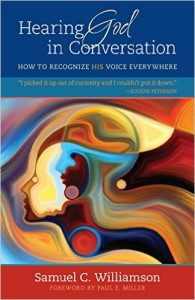 Over the years, I’ve read many books on prayer and meditation. I’ve been very selective in my choices of books to actually spend time with and apply to my relationship with God and my devotional life. There are only a few books on the topic of prayer and talking with God that I would recommend to anybody. And most of the books with which I’ve resonated were written by monks, priests and ancient contemplatives. So, for me to actually review and recommend a book by a contemporary layperson is a rarity!
Over the years, I’ve read many books on prayer and meditation. I’ve been very selective in my choices of books to actually spend time with and apply to my relationship with God and my devotional life. There are only a few books on the topic of prayer and talking with God that I would recommend to anybody. And most of the books with which I’ve resonated were written by monks, priests and ancient contemplatives. So, for me to actually review and recommend a book by a contemporary layperson is a rarity!
Recently, I was asked to review a new book by Samuel C. Williamson (Hearing God in Conversation: How to Recognize His Voice Everywhere from Kregel Publications, 2016, Grand Rapids, MI) on listening to God and seeing our prayers as a dialogue instead of a monologue. I was skeptical because I don’t know Mr. Williamson and for the reasons I mentioned above, but the book was endorsed by Eugene Peterson someone for whom I have great respect. I decided to take a closer look and what I found was just the kind of book I would write on the subject of developing a deeper relationship with God and learning to listen to God’s voice every day.
Williamson’s book is anecdotal, but it comes from a man whose faith is based on a Biblical and theologically orthodox foundation. So, his experiences are filtered through the doctrines of the historical Christian faith. Therefore, I can heartily recommend the chapters of this book to anyone who wants to grow closer to their Creator and Lord. In fact, chapters 4, 5 and 6 are particularly of value to new or young Christians who want to understand the place of Scripture in their daily lives and how they might structure a devotional life.
But this is not a book about form and structure, but about learning that we are free to follow Jesus to where he wants to take us and that we can be free in what we ask him as we would our closest of friends. Williamson writes, “We are involved in a divine dialogue.” The authenticity of the author’s desire to share his experience of the relational nature of God’s personality and character rang true, as did his desire to help others open their hearts to the divine conversation. The book is very appealing at this level.
Williamson also speaks clearly regarding our motives and how misguided our desire for guidance can be. “If we want to hear God in the storm, let’s first learn to hear his voice in the calm,” he writes. And, again, in chapter 1, he peals back our self-centeredness, “We want information; God wants a conversation.”
I found the writer’s questions regarding our presuppositions to be extremely helpful in plowing the ground of our own hearts concerning prayer. “What if God wants to converse with us more than he wants to direct us?” Williamson asks us.
Does that kind of question scare you? Or does that question point out how valuable you are to God? In my own experience, it was several years ago when I came to God with open and empty hands that I found his presence most welcoming and comforting. Williamson offers us help, “It’s not that God doesn’t want to answer our questions. He does. But our obsession with them deafens us to his message. The restrictive nature of our questions limits our ability to recognize God’s voice;” he writes.
As you can see, there is a lot to recommend about this book. In closing my review I want to mention a couple of other things that I really appreciated in reading it and a suggestion that I would make if you choose to read it. I loved that many of Williamson’s illustrations and stories were from his business, family and church experiences. He didn’t compartmentalize his experience of God to one area of his life. Secondly, he offers a broad range of resources and other voices to reinforce and support his convictions and suggestions. And, finally, my suggestion is that you don’t have to read the whole book before you start implementing some of the truths taught here. In fact, I’d suggest that you put the book down from time to time (or close your Kindle if you read like I do) and put into practice something that has struck you as helpful or interesting. —- Jimmy Locklear
________________________________________________________________________________
Disclosure of Material Connection: I received this book free from the author and/or publisher through the Speakeasy blogging book review network. I was not required to write a positive review. The opinions I have expressed are my own. I am disclosing this in accordance with the Federal Trade Commission’s 16 CFR,Part 255.